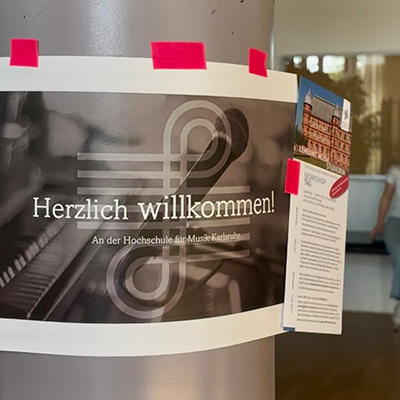
Further Information
Contact
Prof. Dr. Elisabeth Theisohn
Head of the Study Committee
Office hours by appointment
Please send enquiries to:
E theisohn@hfm-karlsruhe.de
Schulmusiktutor*innen
M tutoratlehramtmusik@hfm-karlsruhe.de
Visit us on Instagram:

Workshop day
Artistic teaching degree at grammar schools
Registration deadlines are 1 March and 1 October. More...

Become a music teacher:
Artistic Teaching Qualification for Grammar Schools (School Music)
Do you love music? Are you enthusiastic about the variety it offers you? Do you want to get involved with music in a variety of different ways? Are you curious about how children and young people can perceive and discover music for themselves and want to accompany them in this process?
Then the Artistic Teaching at Grammar Schools degree programme is just right for you. We are convinced that music in schools is more important than ever; that's why we need music teachers who can open their ears in an enthusiastic and inspiring way and listen with curiosity and curiosity.
Bewerbungszeitraum für ein Studium im Sommersemester 2026:
- 01.10.2025 – 01.11.2025 im Onlineportal
Wer? Alle, die sich für ein BA-Schulmusik-Studium und MA-Schulmusik-Studium bewerben möchten - Big Blue Button Infoveranstaltung zur Aufnahmeprüfung am 25.11.2025
- Aufnahmeprüfung: 12.01.2026 – 13.01.2026
Our Artistic Teacher Training Programme in Music at Grammar Schools (School Music) provides the best possible preparation for dynamic and versatile music teaching at school: it offers the greatest variety, the most intensive supervision and the widest range of opportunities to engage with music. Intensive artistic training in the specialisation subject forms an important basis. Compulsory subjects such as singing, piano, choral conducting, music theory, aural training, jazz harmony etc. are taught individually or in small groups and brought together in practical school seminars. Consolidation and networking play a central role here: students develop their individual artistic, academic, pedagogical and practical school skills and bring them together in projects and seminars as facets of a larger whole. In this sense, our highly remunerated SchuMU(T) competition in which all students can bring their individual strengths to the stage in a creative performance.
An important extension of the teacher training programme is the cooperation with other faculties at the university and with schools in the region, with which cooperation events are regularly held e.g. MusikMobil and MusikMobil ! with music education, media education with the Institute for Music Journalism, practical school exercises and research seminars in pedagogical practice).
At the Karlsruhe University of Music, the semester size is rather small with an average of 6 to 7 students per semester, which makes the supervision all the more intensive. At the same time, the small semester numbers mean that the students see themselves as a large “school music family” throughout the semesters. In choir and orchestra projects, big band concerts and workshops, artistic creativity and an understanding of music as an expression of community and understanding develop in close exchange. In addition, regular plenary meetings help to develop and negotiate common interests. The students are actively involved in university policy processes, they provide impulses and implement them and they participate in the development of the degree program, the courses offered and the forms of teaching.
At the Karlsruhe University of Music, the semester size is rather small with an average of 6 to 7 students per semester, which makes the supervision all the more intensive. At the same time, the students see themselves as a large ‘school music family’ due to the small number of semesters. In choir and orchestra projects, big band concerts and workshops, artistic creativity and an understanding of music as an expression of community and understanding are developed in close dialogue. In addition, regular plenary meetings help to develop and negotiate common interests. The students are actively involved in university policy processes, they provide impulses and implement them and they participate in the development of the degree programme, the courses on offer and the forms of teaching.
An aptitude test must be passed before starting the programme. The following subjects can be chosen as specialisations for the Bachelor's degree:
- Piano, guitar
- Vocals
- Violin, viola, violoncello, double bass
- Transverse flute, oboe, clarinet, saxophone, bassoon
- Trumpet, trombone, horn, tuba
- Percussion
- Harp
In the Master's programme:
- Music theory
- Orchestra and choir conducting
- Practical piano playing at school
Parallel to the music degree programme, students study a scientific subject at the KIT Karlsruhe or at the Ruprecht-Karls-Universität Heidelberg and complete an accompanying course in educational science. The programme also includes an orientation internship and a practical semester at a grammar school. After successfully completing the degree programme, you can start your traineeship, which is then completed with the state examination.
Are you interested in studying Artistic Teaching at grammar schools with us, but still have questions? Then write to the head of the degree programme, Prof. Dr Elisabeth Theisohn, or the team of tutors. Or come to the next workshop day - more information here.
